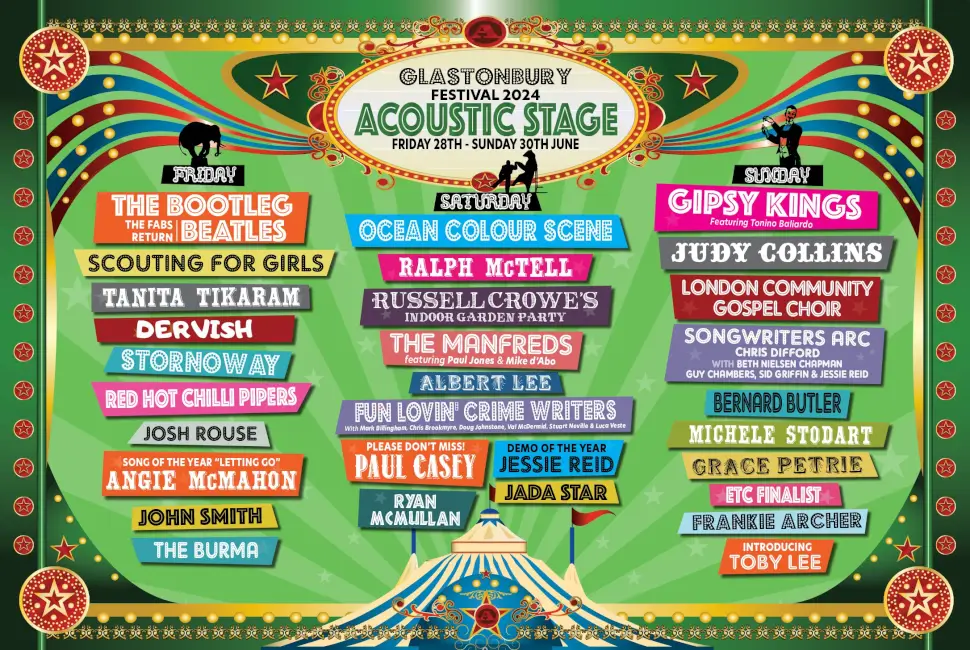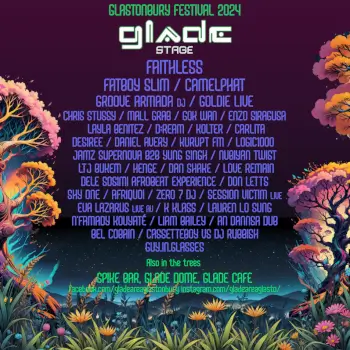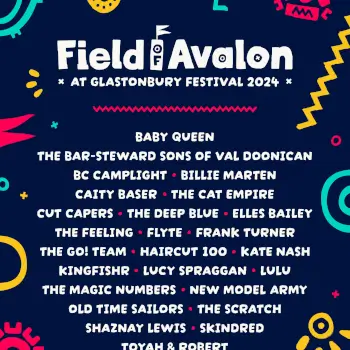
Glastonbury Festival 2013
Wednesday 26th to Sunday 30th June 2013Worthy Farm, Pilton, Shepton Mallet, Somerset, BA4 4AZ, England MAP
£205 (secured with a £50 deposit) - SOLD OUT
Daily capacity: 177,500
Last updated: Mon 24th Jun 2013
Glastonbury Festival boss Michael Eavis has been talking to Radio One's Newsbeat (here) about the interest in contactless wristbands which use RFID technology whilst they were in action at last weekend's Eurosonic Noorderslag festival in Groningen, The Netherlands.

|
|
| Glastonbury 2011 |
RFID stands for Radio frequency identification, used to describe a system that transmits the identity (in the form of a unique heavily encrypted serial number) of a person or object wirelessly using radio waves, without the need for physical contact. In only takes less than 200 milliseconds to read the tags , making them effective for handling large volumes of people (such as at entry gates and main bars. They technology is very durable, remaining useable for years, no matter the weather.
Glastonbury currently uses a registration system where ticketholders' photos appear on the printed tickets, and the Festival organizer hinted he "might be tempted" to replace them with the new system.
He added that he did have his reservation about the system which is very cheap to produce adding, "It's seems an incredible system. It does look as though it's something better than what we're doing at the moment. All the commercial implications of the chip are slightly worrying aren't they?
"I don't want to take people into a land they don't want to go into. And using information about people, I wouldn't be happy about that."
The company have confirmed the technology will be used for general admission at "a couple" of UK festivals in 2012, and IOW Festival boss John Giddings told eFestivals he intended to use them (here).
More details of festivals taking up Contactless Wristbands are expected to be announced before the end of this month. Festival bosses we asked to contribute were unprepared to answer our questions ahead of these announcements.
In the wake of the news eFestivals exclusively brings you more details about this new festival 'land' and the technology used in it.
The RFID system is billed by Intellitix's Steve Jenner as, "the most exciting and game-changing development to hit the market for years and its already revolutionising the way festivals are experienced, produced and shared online."
Londoners have been using RFID for years in the Oyster Card transport system and you've probably seen the Mastercard and Visa Paypass points now installed in many high street shops and cafes. In the festival realm, The Isle of Wight implemented a cashless system from a company in its VIP area this year. Intellitix's RFID system has gained plaudits after being used at Lollapalooza Festival in Chicago. The company do not supply the wristbands they are produced by the festivals existing wristband supplier. They supply the hardware, software and staffing for the system that reads the wristbands and has the potential to offer many additional services.
Wristbands are scanned as festival goers enter and leave venues or areas either through turnstiles or hand-held devices scanning their wristbands, and organisers able to track the data.
The wristband contains a tiny electronic 'tag' which - when placed near a reading device - becomes a key that links the person wearing it to a profile in the event's computer database. This profile can consist of anything - eg. the customer's identity (where festivals need their tickets to be tied to a specific individual, like Glastonbury Festival which uses a photograph and each individual's ID).
Although often festival goers are unhappy to divulge personal data information, not everyone is happy to divulge this, and personalisation is not required, the profile can also be completely anonymous carrying nothing more than the right of entry to the event. On the other hnad it could be commercially very detailed and the database could even hold festival goers Facebook profiles as well as holding secure credit card details, allowing fans to use their wristbands to pay for things on-site without the need to bring cash or cards with them.
Festivals do not have to use the wristbands as use cashless payment systems that's a separate application of the technology. Some festivals may simply put the 'admission right' onto the wristband, which stops fraudulent tickets and touting. Other promoters may want to use a cashless system to reduce queues on site and make it easier for festival fans to purchase food and drink.
Festival goers could also add credits to wristbands that are in the rightful possession of another person. For instance, a parent could top up a childs credit or someone could gift a drink or t-shirt to a friends by sending such information to the event database using application that have already been specially designed for this function.
Intellitix's Steve Jenner explained to eFestivals, "Every festival is unique with its own set of parameters so there is no one-size-fits-all with RFID. We deliver a tailored solution that best fits the needs and wishes of that event and its audience, allowing it to benefit to the fullest extent from the cost savings and new revenue opportunities that RFID brings!"
At the request of festival organizers events can install a cashless payment system (which is a separate application of RFID to the event access system) and credit can either be loaded in advance (via web or mobile) or at the festival (via mobile or top-up kiosks). Intellitix's Steve Jenner told eFestivals, "Logistically, it makes the organiser's life much easier, significantly increasing efficiency and control. For instance, we provide an entire system for managing event staff which accounts in real time for the whereabouts of all people and equipment, saving a lot of headaches and potential for lost time and items. Plus it eliminates the need for all laminated, stick-on or other types of uncontrollable backstage and working passes."
Jenner added, "It massively reduces ticket fraud and crime with major positive implications for crowd safety, without being invasive for the attendee. Financially, it saves a lot of costs and opens up new revenue streams, for instance making events more attractive to sponsors without the need to plaster the site with brand logos. Creatively, it opens up a new dimension of limitless possibilities for innovation by connecting the real and the virtual worlds. Most importantly, it will spectacularly enhance the fan's festival experience."
Queuing times can also be reduced as festival goers will already have their wristbands on when they arrive and so theres no need to queue in order to exchange them at the gates, and it doesnt need physical contact with stewards on site or the readers themselves. At large events with multiple areas and venues, the queues can be monitored in real time by not just event organizers but fans as well as using mobile devices, allowing them the option to visit an alternative location with less or no queue.
Lost or stolen wristbands to be cancelled as soon as they're reported missing, and then anyone using them can be caught on their first attempt which is a pretty big deterrent.
Future festivals would not need tickets. All the wristbands would be sent out in advance and would not need to be sent via secure postage, as if a wristband is lost in the post, it can be cancelled immediately and a new one issued for the fan to pick up at the box office of the event.
Before they are shipped the wristbands are checked by the company that supplies them and again by Intellitix (who receive them first in order to programme them). Then theyre also checked when festival goers arrive. If a wristband is defective, a replacement can be issued very quickly.
The system is robust to UK festival weather conditions with the entrance hardware fully waterproof and the portals can even be submerged up to 18 inches. The whole Intellitix system is networked, with every piece of hardware able to work independently as well, should the network go down. Jenner explains, "We bring our own WI-FI and WiMax (as used in Formula One Racing) network so as not to rely on the event's. We worked at a wide diversity of festivals in North America this summer in lots of different conditions, from the middle of a desert to central Manhattan, and it proved to be extremely robust. It simply won't fail."
Jenner adds he see no disadvantages to the system, "The praise from fans and organisers who used RFID in the United States this summer and the appetite already shown by prospective users in the UK and Europe for next year backs up our claim that there are no disadvantages. The most wonderful thing about RFID is that it is a win-win for everyone who comes to the festival marketplace with good intent fans, organisers, traders, artists, security and other suppliers. Everybody. In the United States, every organiser who used the service has since signed up to multi-year agreements which speaks volumes."
However as Michael Eavis pointed out the system could be open to commercial exploitation, giving festival organizers the chance to carry out ID harvesting, and the farmer had concerns about whether introducing the wristbands would result in his, and other festivals, becoming "too commercial."
Whilst the system may offer great convenience no queues to get in, and perhaps the chance to buy food/ drinks or withdraw cash; no need to bring and carry around cash, there could be a few downsides. What happens when you haven't spent all the money? Jenners responds, "That's entirely up to the discretion of the client festival. They can have it automatically credited back to the fan at the end of the event or could roll it over to the next event with an incentive, such as an extra £5 free credit or a free pint or T-shirt. This isn't like the token systems where people go home with useless coins in their pockets, ending up being very expensive and ugly souvenirs.
"It's also brilliant for connecting with new artists that you discover at the festival. Too often I've been surprised by a great new band early on the first day and then lost their name completely by the time I've got home on Monday. Now, you could just tap your wristband at a 'Like' station in the tent and voilà you're connected to the band on Facebook."
That could come as a shock if youve forgotten to tell your boss, or parents where you are.
eFestivals saw the cashless wristbands in use at this summers Isle of Wight Festival, where they were only valid in the VIP area and not useable in the wider site.
From what we saw it did simplify things - the bar staff had a scanner which read the chip in the band, deducted the funds and told the wearer how much they had left on it, as to whether it made it quicker we are unsure as the staff spent as much time juggling the scanner between them as they did getting change for people. The wristbands were probably faired better over the weekend than some of the paper tokens people were using in the rain on Sunday.
There was only one point to buy/charge them and always a fair queue at it through the weekend this could only do with a credit/debit card, so Festival goers still had to take one with them. The other disadvantage was that they carried £30 each time, no more or less, and once charged if not all spent by Sunday night what was left on it was lost, there was no refund. eFestivals feels that maybe the ability to control how much you put on would be better so that you could charge up, then put your cards back in the car and just have the wristband all weekend.
The device itself was a plastic wristband with a chip embedded into it - quite small and certainly no less comfortable than a festival wristband.
Our reviewer said the idea was good, but needed some changes to become truly workable across a festival site.
Glastonbury Festival takes a year out in 2012 and returns in 2013 and will take place from Wednesday 26th until Sunday 30th June 2013. There are no acts confirmed yet for 2013.
Registration for Glastonbury Festival 2013 is now open. Everyone who plans to the come the Festival must register, and that includes children aged 13, 14 and 15. Each ticket sold will feature a photograph of the person in whose name it is registered and will be non-transferable. So if you plan to buy tickets for friends or family you must make sure they all register.
Registration does not reserve or guarantee you a ticket when they go on sale some time in 2012, exact date to be confirmed, but if you don't register you will not be able to buy a weekend ticket for Glastonbury Festival 2013. If you opt to save this information you will be able to use your registration number again in future years. Make sure the e-mail address you provide is one to which you will have long term access.
Online registration for 2013 can be carried out by clicking here.
Latest Updates
 Glastonbury Festival 2024
Glastonbury Festival 2024festival details
last updated: Yesterday, 09:57am
 Glastonbury Festival 2024
Glastonbury Festival 2024line-ups & rumours
last updated: Yesterday, 09:57am
 Glastonbury 2024 - The Glade Posters Reveal Huge Lineup
Glastonbury 2024 - The Glade Posters Reveal Huge LineupFaithless, Fatboy Slim, and Groove Armada confirmed
last updated: Mon 22nd Apr 2024
 Glastonbury 2024 - Field Of Avalon Reveals Lineup
Glastonbury 2024 - Field Of Avalon Reveals LineupBaby Queen, BC Camplight, The Feeling to take to the Avalon Stage
last updated: Tue 16th Apr 2024
 Glastonbury 2024 - First Acoustic Stage Acts Announced!
Glastonbury 2024 - First Acoustic Stage Acts Announced!The Bootleg Beatles, Scouting For Girls, and Ocean Colour Scene set to perform
last updated: Fri 12th Apr 2024





